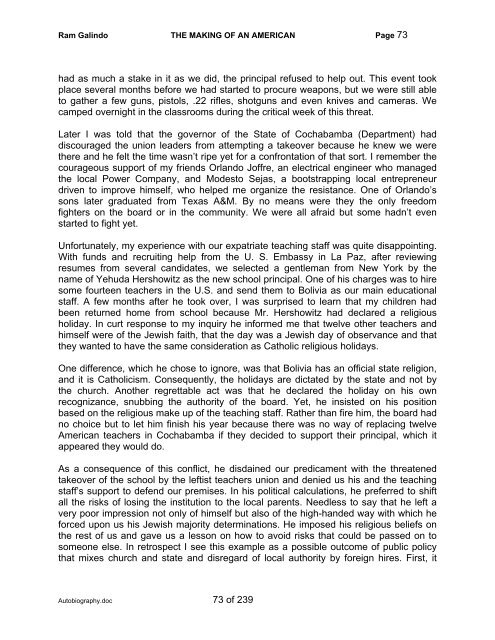Autobiography - The Galindo Group
Autobiography - The Galindo Group
Autobiography - The Galindo Group
Create successful ePaper yourself
Turn your PDF publications into a flip-book with our unique Google optimized e-Paper software.
Ram <strong>Galindo</strong> THE MAKING OF AN AMERICAN Page 73<br />
had as much a stake in it as we did, the principal refused to help out. This event took<br />
place several months before we had started to procure weapons, but we were still able<br />
to gather a few guns, pistols, .22 rifles, shotguns and even knives and cameras. We<br />
camped overnight in the classrooms during the critical week of this threat.<br />
Later I was told that the governor of the State of Cochabamba (Department) had<br />
discouraged the union leaders from attempting a takeover because he knew we were<br />
there and he felt the time wasn’t ripe yet for a confrontation of that sort. I remember the<br />
courageous support of my friends Orlando Joffre, an electrical engineer who managed<br />
the local Power Company, and Modesto Sejas, a bootstrapping local entrepreneur<br />
driven to improve himself, who helped me organize the resistance. One of Orlando’s<br />
sons later graduated from Texas A&M. By no means were they the only freedom<br />
fighters on the board or in the community. We were all afraid but some hadn’t even<br />
started to fight yet.<br />
Unfortunately, my experience with our expatriate teaching staff was quite disappointing.<br />
With funds and recruiting help from the U. S. Embassy in La Paz, after reviewing<br />
resumes from several candidates, we selected a gentleman from New York by the<br />
name of Yehuda Hershowitz as the new school principal. One of his charges was to hire<br />
some fourteen teachers in the U.S. and send them to Bolivia as our main educational<br />
staff. A few months after he took over, I was surprised to learn that my children had<br />
been returned home from school because Mr. Hershowitz had declared a religious<br />
holiday. In curt response to my inquiry he informed me that twelve other teachers and<br />
himself were of the Jewish faith, that the day was a Jewish day of observance and that<br />
they wanted to have the same consideration as Catholic religious holidays.<br />
One difference, which he chose to ignore, was that Bolivia has an official state religion,<br />
and it is Catholicism. Consequently, the holidays are dictated by the state and not by<br />
the church. Another regrettable act was that he declared the holiday on his own<br />
recognizance, snubbing the authority of the board. Yet, he insisted on his position<br />
based on the religious make up of the teaching staff. Rather than fire him, the board had<br />
no choice but to let him finish his year because there was no way of replacing twelve<br />
American teachers in Cochabamba if they decided to support their principal, which it<br />
appeared they would do.<br />
As a consequence of this conflict, he disdained our predicament with the threatened<br />
takeover of the school by the leftist teachers union and denied us his and the teaching<br />
staff’s support to defend our premises. In his political calculations, he preferred to shift<br />
all the risks of losing the institution to the local parents. Needless to say that he left a<br />
very poor impression not only of himself but also of the high-handed way with which he<br />
forced upon us his Jewish majority determinations. He imposed his religious beliefs on<br />
the rest of us and gave us a lesson on how to avoid risks that could be passed on to<br />
someone else. In retrospect I see this example as a possible outcome of public policy<br />
that mixes church and state and disregard of local authority by foreign hires. First, it<br />
<strong>Autobiography</strong>.doc 73 of 239


